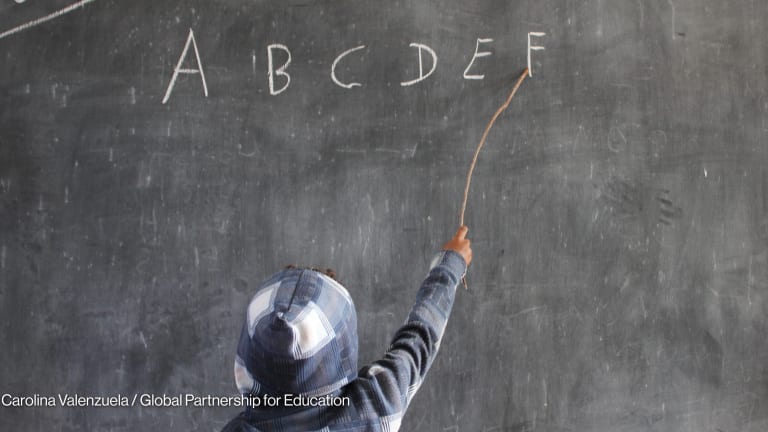
Do conflicts arise as a consequence of a government’s indifference to education?
That’s the lesson learned from the ongoing crisis in the Central African Republic, according to Gisele Bedan, the country’s minister of education.
“Behind the CAR conflict there is an education crisis — if previous governments had given more attention to education, we wouldn’t be where we are now,” Bedan told Devex on the sidelines of the Global Partnership for Education’s second replenishment conference in Brussels last week.
With almost its entire population in desperate need of food, the conflict-ridden CAR remains on the brink of a humanitarian catastrophe. Amid increasingly bloody clashes between Christian and Muslim militias, the escalation of violence waged by these armed groups since December 2013 has forced more than 800,000 people to flee their homes.
GPE data shows that today over 50 percent of the 57 million children worldwide not attending primary school live in fragile states “characterized by weak institutional capacity and governance, affected by political instability and in many cases persistent violence.” The majority of these children are girls.
Despite the critical situation and renewed violence in March, some 65 percent of schools have been reopened in the CAR. But can the re-establishment of education systems in fragile state contexts provide a return to normalcy? In an analysis on the subject published last year, the GPE highlighted that a focus on education in fragile states promotes peace-building and conflict mitigation, as well as fostering economic growth.
Bedan agreed with the GPE’s assessment.
“Education is a priority,” asserted the minister. “Despite the crisis we face, we managed to maintain the 16 percent of national budget for education, and the objective is to reach 19 percent in the next budget.”
She added: “What we need is support to reopen all the country’s schools, rebuild the ones that have been destroyed, build new ones, as well as set up temporary learning spaces for displaced people in order to avoid them dropping out of school altogether.”
Supporting education in fragile and conflict-affected states is listed as one of the five main objectives of the GPE’s 2012-2015 strategy; in the past year alone, the partnership has increased its engagement in fragile states and currently supports 28 countries considered fragile or affected by conflict out of a total of 59 developing country partners.
Challenges
Working in fragile and conflict-affected countries entails dealing with challenges that the GPE, like any other organization, is doing its best to cope with.
Margarita Focas Licht, one of the partnership’s top education experts, explained that an education sector plan is always required to operate in any state: “When we realized that in fragile states they may not have the data, the analysis, the basis to develop a good sector plan, we adjusted our approach so that they can now join the GPE and receive funding on the basis of a transitional education sector plan.”
Focas Licht gave the example of Somalia where, she said, there was initially no strategic plan at all. Now, there is a plan that gathers enough information to determine the short-term priorities, while they work on a broader sector strategy.
She pointed out that another challenge they experienced is that in several situations — for example, in Mali, the CAR and Guinea-Bissau — was that the scenario changed while funding was already on the way.
“We have observed that our process to develop plans take some time, while the money often needs to get there much faster,” explained Focas Licht. “So we need a funding approach for accelerating funding in this kind of situation.”
To address this issue, the GPE has put in place an accelerated application mechanism that allows countries to apply for 20 percent of the eligible funding on the basis of their immediate needs. Based on this application, they can receive funding quickly, while working on implementing the rest of the proposal to receive the remaining funding. The mechanism is based on results, but remains flexible given an often uncertain and unstable learning environment.
“We are adapting this approach, by using the indicators that are appropriate in fragile states and are different from the ones of well-functioning states,” Focas Licht said. “We have to see these countries on a trajectory and help them move toward a more stable situation.”
Read more development aid news online, and subscribe to The Development Newswire to receive top international development headlines from the world’s leading donors, news sources and opinion leaders — emailed to you FREE every business day.
Read more on the Global Partnership for Education:
● Take action and get more children into school
● What the private sector wants from the GPE
● 7 buzz topics at the GPE replenishment conference








